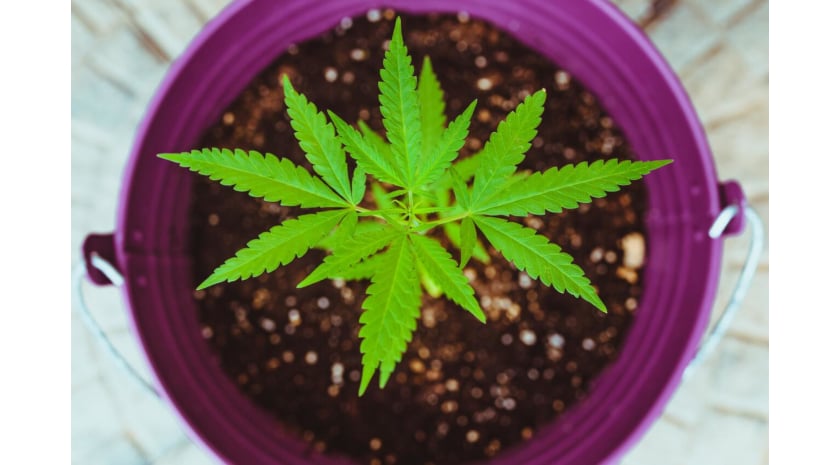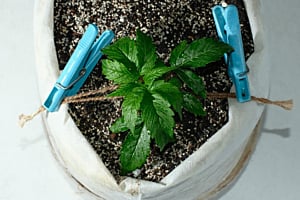Quality marijuana seeds are important for healthy bud-producing plants. Nutrition is also a vital component in your crops’ growth, which they get from the soil. Organic nutrients for weed are the next step. High-quality cannabis requires more fertilizer, and the type varies during each growth stage. Many growers use organic nutrients for weed in their gardens for better results.
Learn about marijuana nutrients and the right mix and amount required at every phase to maximize your yields. Discover organic cannabis fertilizers, their pros and cons, and the best brands to use for your plants.
Want to make your own? Find out more about compost tea and how to produce it at home.
Let’s get started.
What are cannabis nutrients?
Cannabis nutrients are food your crops need to develop well and produce large yields of quality nugs. While all plants depend on light, oxygen, and water for survival, they also need an advanced combination of minerals and vitamins to thrive. These nutrients occur naturally but in varying quantities. Plants typically mine them from the soil, taking them up through their roots.
The primary components are macronutrients such as nitrogen (N), phosphorus (P), and potassium (K).
There are also micronutrients like:
- Calcium
- Magnesium
- Iron
- Copper
Growers mix organic cannabis nutrients with the soil when transplanting cannabis crops outside and add more to the top of the earth later in the cycle if needed.
Indoor gardeners dilute liquid fertilizer in water before watering plants. The pH must be between 6–7 for soil and 5.5–6.5 for hydroponics to maximize the food absorption rate.
What nutrients does a cannabis plant need?
The key organic nutrients for weed plants to develop healthily are nitrogen, phosphorus, and potassium.
They also need a smaller amount of calcium, magnesium, iron, and copper. Every growth stage requires different quantities of each element—more N in the vegetative phase and additional P and K during flowering.
Let’s understand the essential organic nutrients for cannabis in detail:
Nitrogen
This chemical element is a vital component of chlorophyll, which plants need to convert sunlight into energy and grow.
It’s responsible for their development during the vegetative phase. It’s also part of amino acids, the protein building blocks that strengthen your crops. N also creates nucleic acid, a key ingredient in DNA and RNA, without which cells can’t develop and multiply. It’s the best organic nutrient for weed during the vegetative stage. The major sign of nitrogen deficiency is yellowing and dropping leaves during vegging.
Phosphorus
Among cannabis’ organic nutrients, phosphorus is important because it helps plants produce large, healthy nugs by harvesting the sun’s energy. If there’s an inadequate supply of the element, the roots of marijuana crops may not develop well, possibly affecting flowering. Enables the production of significant, dense buds by fueling strong plant structures. Wanna know how to distinguish phosphorous deficiency from other ones, browse this guide on P deficiency in cannabis.
Potassium
Potassium is another one of the vital organic nutrients for weed. It regulates plants’ systems that keep them growing healthily, such as controlling water and salt concentrations. The element also helps in ATP production, which stores energy for crops to use as they develop. Signs of insufficient K are weak plants appearing burnt. In this guide, we described in detail how you can identify and tweak potassium deficiency. Feel free to read it if you are interested.
Plants also require smaller quantities of other macronutrients, like calcium, magnesium, and sulfur. Trace elements or micronutrients are necessary for efficient development. Zinc, iron, manganese, silicon, molybdenum, and cobalt play minor roles.
How to use and mix cannabis nutrients
Mixing organic cannabis nutrients is simple as fertilizer bags and liquid bottles display the amount of each key element in the product. The information represents N-P-K, so 10-4-4 means 10% nitrogen, 4% phosphorus, and 4% potassium by weight.
Vegetative organic fertilizer for weed has a higher ratio of N to P and K. Use a mix with lower nitrogen when plants are in flowering mode.
Manufacturers simplify the identification process if you’re unsure what the numbers mean by categorizing their products as “grow” and “bloom.”
Exercise caution when using cannabis nutrients that are organically based on the recommended dose—it’s generally too high. To find the optimal amount for your plants, start with a lower portion—1/3 or 1/2—before increasing it if necessary.
Pay close attention to your crops and check them daily. If the leaves are yellowing during the vegetative stage, your plants may lack nitrogen. Note that this discoloration is normal when they’re flowering.
Even when using the best organic nutrients for weed, avoid overfeeding as it can cause “nute burn” .
As harvest approaches, stop giving your plants fertilizer. Use clean, pH-neutral water to clear the buds of any remaining nutrients. This process also improves the taste of your weed compared to feeding your crops till collection time.
Liquid nutrients
Gardeners usually use liquid organic nutrients for weed indoors, but you can apply them to outdoor crops too. Use a container to mix them with water, making sure you use the right amount of water and add the recommended solution ratio.
Be cautious about overfeeding liquid organic cannabis fertilizers as they’re fast-acting, and the roots easily absorb them, increasing the risk of damage. Don’t add them each time you water your plants—every other watering is best.
Check your pH
When mixing organic cannabis nutrients, use a meter to check your water’s pH level regularly. Ensure it’s within 6 and 7 for soil and 5.5–6.5 for hydro. If it’s outside this range, your plants may not absorb the food they need.
Comparing nutrient and fertilizer brands
What are the best organic nutrients for weed? With many brands to choose from, here are the top 7 for your comparison:
Nature’s Living Soil: Super Soil Concentrate
Reviewers claim the Super Soil Concentrate is one of the easiest organic nutrients for weed to use. It’s a fully-organic non-NPK formulation made especially for cannabis cultivators. To use, mix it with regular soil and water plants until it’s time to harvest the buds. This organic cannabis fertilizer has many ingredients, including blood meal, organic earthworm castings, bat guano, bone meal, kelp meal, dolomite lime, and beneficial microorganisms.
Bud Juice Organic Trace Micro Nutrients for Cannabis
Another choice of best organic nutrients for weed, this Bud Juice product supercharges your yields with ocean-based nutrients—phytoplankton and chelates. Although the minerals come from seawater, there’s no salt in the fertilizer. These organic nutrients for weed plants contain sufficient nitrogen, phosphorus, and potassium to use only once a week.
Dyna-Gro Liquid GROW & Liquid BLOOM
One of the best organic nutrients for weed in liquid form is Dyna-Gro’s GROW and BLOOM. The former has an NPK ratio of 7-9-5 that promotes healthy plant growth, while the latter boasts six essential macronutrients and ten vital micronutrients.
General Hydroponics
The popular Flora combo features three bottles of pH-balanced nutrients to cover the growing process. Some cultivators rate these the best hydroponic nutrients for cannabis, but they’re also suited to soil or coco coir growing mediums.
- FloraGro elevates development during the vegging stage.
- FloraMicro also aids growth, but it’s more focused on producing flowers.
- FloraBloom helps to fatten and condense the nugs.
Fox Farm
Fox Farm’s liquid nutrient trio is among the best fertilizer for marijuana plants. It’s user-friendly and covers all your bases throughout the lifecycle. It comes in three bottles:
- Grow Big boosts vegetative growth, helping produce compact, healthy plants.
- Big Bloom provides the nutrients flowering plants need, increasing budding sites. It’s made of bat guano and earthworm castings.
- Tiger Bloom is high in phosphorus and a fast-acting, potent fertilizer that increases yields.
Advanced Nutrients Bloom
The Bloom, Micro, and Grow trio provides your crops with the requisite nutrients at every life cycle step. Many growers rate this the best fertilizer for growing marijuana:
- Grow fattens your plants up during the vegetative stage.
- Micro assists with growth and prepares crops for the flowering phase.
- Bloom boosts flower production so that you maximize your yields.
Homegrown Cannabis Co. Standard Pack
The comprehensive Homegrown Cannabis Co. Nutrients Standard Pack covers all phases with four products that may be the all-time best fertilizer for marijuana:
- Seedling Booster: These nutes power growth in the early stages of vegetation by producing healthy roots and enabling rapid progress.
- Growtime Fertilizer: This product encourages and eases nutrient uptake to promote growth. It includes the best nutrients for vegetative stage development.
- Flower Fertilizer: This product gives your crop an energy injection when it desperately needs it to produce the desired chunky colas and sparkling trichomes.
- Plant Booster: This general health tonic can cause early flowering, aids the root system, and improves nutrient uptake to spur lush, explosive growth.
Homegrown Cannabis Co. Organic Pack
This combo covers the entire cultivation process for the natural grower by providing the best nutrients for cannabis. The Homegrown Cannabis Co. Organic Pack includes the same products as the Homegrown Cannabis Co. Nutrients Standard Pack, except they’re all organic:
- Seedling Booster
- Growtime Fertilizer
- Flowertime Fertilizer
- Plant Booster
Many experts agree that natural products are the elite choice and better for the environment, your crops, and you.
What are the best organic nutrients for weed? With many brands to choose from, here are three for your comparison:
Organic cannabis fertilizers
Most experienced growers suggest using the best organic nutrients for weed to treat crops grown from feminized seeds and other cannabis variants. Natural solutions are healthy for your plants and much better for the environment than synthetic and chemical alternatives. They’re also less potent.
Organic cannabis nutrients come from natural sources like vegetable and animal waste. They also include beneficial minerals from sediments such as gypsum and glacial rock dust. In powder form, they’re more forgiving than liquid fertilizers, which are more soluble. Just mix them into the soil and water your plants.
Here are the ten most popular organic nutrients for weed plants:
Blood meal
An excellent nitrogen source, this fertilizer is powdered, dried animal blood, generally from cows. The organic matter has a reputation for repelling animals from gardens.
Fish meal
Usually made from small ocean fish like anchovies, herring, and sardines, the product adds nitrogen to plants and helps with photosynthesis. Don’t overfeed your crops as it may lead to nutrient burn.
Bone meal
From ground animal bones, this fertilizer is one of many organic cannabis nutrients that increase phosphorus and calcium levels for flowering plants. Only use this substance when your soil pH is below seven.
Bat guano
This material improves soil quality by adding the P element to plants and increases yields. Bat guano is one of the best organic fertilizers for cannabis grown outdoors.
Wood ash
Mix the substance with your compost or sprinkle it on the soil to add potassium to your crops. Wood ash is one of the best organic nutrients for weed in the soil as it neutralizes acidity.
Kelp meal
This dried-up algae and seaweed fertilizer is an excellent potassium source, providing plants with valuable micronutrients, natural growth hormones, and vitamins to help increase yields. The substance improves soil structure, increases frost tolerance, and reduces plant stress from drought.
Dolomite lime
This organic fertilizer for cannabis provides plants with equal portions of calcium and magnesium, helping them grow strong and healthy. It also corrects your soil pH by increasing it and reducing acidity.
Chicken manure
The dung is rich in nitrogen, phosphorus, and potassium, slowly releasing nutrients that strengthen plants. Add the manure to your compost heap as the raw material can burn your plants due to its high N levels.
Coffee grounds
Used coffee grounds add organic matter to the soil, improving water retention, drainage, and aeration. They also aid microorganisms flourish, boosting plant growth.
Compost
Composting is a sustainable and cost-effective way to provide organic nutrients for weed. Start a heap by adding waste you throw away, such as eggshells, vegetable leftovers, and banana peels. Growers can learn how to make cannabis compost using combinations of worm castings, fish meal, blood meal, wood ash, kelp, chicken manure, Epsom salts, compost, and rock dust.
Other excellent sources of organic cannabis nutrients include oyster shells, worm casting, potash rock, and compost tea.
Benefits of organic fertilizers for cannabis plants
Organic cannabis fertilizers offer growers many benefits besides boosting plant health. They’re ideal for new gardeners because they release nutrients slowly, minimizing the risk of overfeeding your crops.
Adding organic nutrients for weed plants to your soil continually enriches the earth’s quality, making it more fertile year after year. They help soil microorganisms flourish, which keeps your plants healthy throughout their life cycle. Materials like wood ash can improve water retention, helping the soil maintain the natural elements and reducing run-off.
Some cultivators claim that using organic nutrients for weed raises bud production and enhances their flavor and terpenes. Flush out any residue about a week before harvest with clean water to ensure there’s no fertilizer taste.
Organic cannabis nutrients come from renewable sources, making their use sustainable and environment-friendly. As most natural materials are easy to find, they’re more cost-effective than chemical fertilizers, helping growers save money.
Disadvantages of organic nutrients for cannabis plants
There are a few downsides to using organic weed nutrients, especially if your cannabis plants are nutrient-deficient—they take longer to absorb powdered fertilizers. This delay can lead to further damage. The liquid matter is faster-acting and more suitable under these circumstances.
When using organic fertilizer for weed, the nutrient breaking-down process by microorganisms is slower in colder temperatures, depriving plants of the food they need. Some materials may attract insects and pests.
How to make compost tea for marijuana plants
Composting is a highly popular method of adding organic nutrients for weed to grow healthy cannabis plants because it’s easy to do. By steeping the matter, which contains essential nutrients and microorganisms, you make compost tea in aerated water.
Although the solution shouldn’t replace organic fertilizer for weed, it’s a great way to introduce nutrients, fungi, and beneficial bacteria to crops. The process helps plant growth and protects it from disease, resulting in hardy and resilient herbs.
Apply compost tea to the soil or spray it on plant leaves. When doing the former, you introduce a healthy, aerobic microorganism colony, which does the following:
- Retains nutrients
- Aerates the soil
- Helps with water retention
- Aids healthy root growth
- Enhances nutrient absorption
- Prevents diseases
Is compost tea one of the best organic fertilizers for cannabis?
Want to make compost tea at home?
Here are five ingredients that work well:
- Compost: The organic matter should contain large colonies of microorganisms and nutrients, aiding the proliferation of fungal growth in the solution. It’s best if the pathogens are local, meaning they come from sources within your area.
- Worm castings: Another source of organic nutrients for weed, the ingredient is from worms’ digestion process. Castings are refined, introducing microorganisms and providing plenty of nutrients in a readily-available form for plants.
- Fish hydrolysate: This nitrogen-rich matter comes from fish and crustacean exoskeletons, helping feed and boost fungi populations. The latter also contains chitin, a plant immune booster.
- Kelp: The fifth ingredient of the organic nutrients for cannabis, kelp is a food source for fungi that propagates while brewing the tea. It also provides a platform for fungal populations to start and develop.
- Molasses: This item is food for bacteria that grow during tea brewing.
Make and use compost tea as organic fertilizer for cannabis by following these five easy steps:
Build a compost tea brewer
Either buy pre-built tea brewers or DIY to save money. To determine the size of the brewer, know the size of your marijuana grow area. Most gardeners use 5-gallon buckets to make organic weed nutrients.
Connect an air pump on the outside of the bucket to an aerator apparatus at the bottom. The devices oxygenate the water to help the microorganisms breathe. Add a 400-micron mesh bag to hold the tea ingredients.
Plan your schedule
The brewing process takes between 24 and 36 hours, so decide when you want to use the organic cannabis nutrients.
Don’t brew it too long because if the microorganism colonies grow too big, they’ll run out of space or oxygen and die, damaging the solution. Apply the tea within 36 hours of making it.
Use only clean water
Using chlorinated water, give it time to sit and breathe to let the chemicals break down. While brewing, keep the solution away from direct sunlight. Keep the air pump working so it pushes oxygen through the water.
Finish your compost tea
Increase benefits to your organic nutrients for weed plants by adding bacteria and fungi food midway through the brewing process to boost microorganism growth.
Apply compost tea to your cannabis plants
Use your compost tea by applying it to plant roots or spraying their foliage. Dilute the solution with water using a 1:20 ratio before adding it to the soil. Don’t apply the organic fertilizer for cannabis through drip irrigation lines, as they’ll clog up over time.
Gravity-feed the compost tea or use a diaphragm pump. Avoid centrifugal ones as you risk disrupting the microorganisms during watering.
When using the solution as a foliar spray, the dilution should be one part compost tea to two parts water.
Apply the tea in the morning or evening, during periods with low temperatures and no direct sunlight. These times are when the stomata (pores in the plant’s foliage) are open to receive the organic nutrients for weed.
Adding organic nutrients for weed plants to your soil continually enriches the earth’s quality, making it more fertile year after year. They help soil microorganisms flourish, which keep your plants healthy throughout their life cycle. Materials like wood ash can improve water retention, helping the soil maintain the natural elements and reducing run-off.
When should you start organic fertilizing?
We don’t suggest adding the best organic nutrients for cannabis to young plants, as they’re delicate and could be damaged. Most growers don’t start giving their seedlings nutrients until they grow stronger. Begin your feeding regime once the small plants have 2–3 healthy sets of leaves. The plants can go into shock or suffer nutrient burn if you give them fast-acting liquid nutrients too soon. Overfeeding can also stunt growth or cause a nutrient lockout.
When should you stop organic fertilizing?
Most growers recommend flushing your plants in the last week or two before harvesting. Stop feeding your crops the best organic fertilizer for cannabis and give them only fresh water to rinse the buds. Experts say flushing improves flavor, eliminating the chemical taste.
Go organic
When choosing marijuana fertilizers, more growers are opting for healthier alternatives instead of chemical products because they provide more benefits than manufactured ones. If you prefer store brands, go for the best organic nutrients for weed, like those mentioned above.
For DIY-ers, preparing homemade solutions requires knowledge and effort, but the rewards are worthwhile. Whichever option you favor, going organic is the best way to grow your high-quality marijuana seeds and enjoy the fruits of your labor.
Discover more growing tips and browse a wide range of premium cannabis seeds on the Seed Supreme site. Don’t forget to share this article with friends to help them on their marijuana growing journey.

 THC
THC







